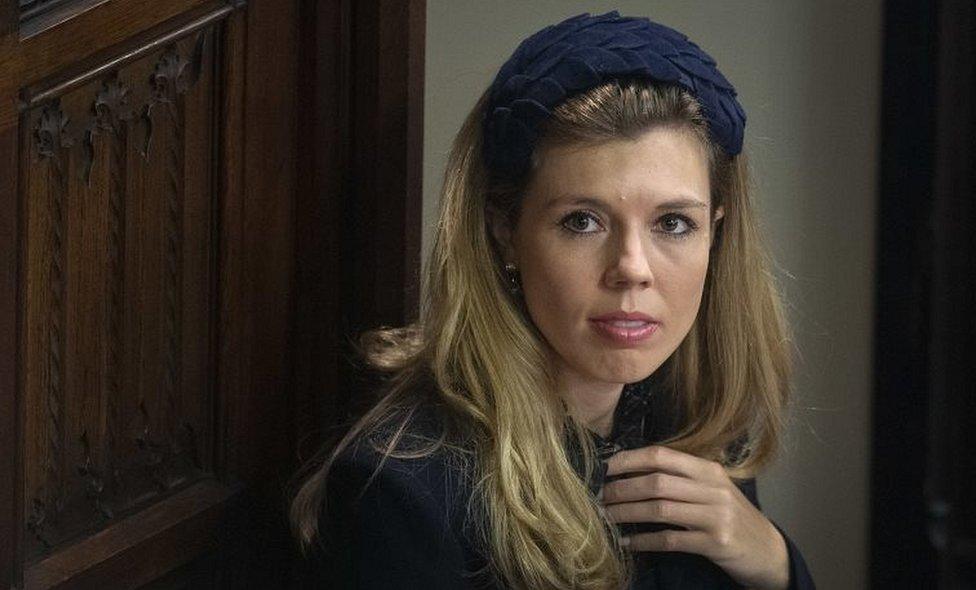Nothing to see here, says Boris Johnson over flat costs investigation
- Published
Boris Johnson: “What we are doing is focusing on the stuff that really matters.”
Boris Johnson has said he will comply with an inquiry into the funding of his Downing Street flat revamp, but added: "I don't think there is anything to see here or worry about."
The PM insisted he was "focusing on the stuff that really matters".
The Electoral Commission believes the Conservative Party may have broken the law, amid reports costs were initially covered by donations.
Labour urged the PM to reveal "quickly" who paid the bill in the first place.
Party leader Sir Keir Starmer said the situation was becoming "farcical", adding that "it would take [Mr Johnson] about one minute" to give the details, "and then he can get back on with the day job".
Questions over the funding of the Downing Street flat refurbishment, overseen by Mr Johnson's fiancée Carrie Symonds, have dominated the headlines for several days.
It has been reported that cost of recent works - carried out by interior designer Lulu Lytle - was as high as £200,000.
Prime ministers get £30,000 per year from the taxpayer to assist with such improvements.
Mr Johnson has said he paid the costs himself, but he has not specified whether this happened when he first received the bill, or whether he was loaned the money and later repaid it.
Normally, MPs have to register within 28 days any donations or loans that could influence their actions - and there is a list of ministers' interests with separate reporting rules.
The Electoral Commission - the watchdog overseeing political finances - will investigate the Conservative Party's compliance with laws on political donations, having said there are "reasonable grounds to suspect that an offence or offences may have occurred".
'Farrago of nonsense'
Ms Symonds has denied reports that she objected to the way the flat had been decorated by previous PM Theresa May, and which high society magazine Tatler claimed a visitor had called a "John Lewis furniture nightmare".
On a visit to a London school, Mr Johnson joked that it was "the one thing I object to in this whole farrago of nonsense", adding: "I love John Lewis."

Work overseen by Carrie Symonds is reported to have cost up to £200,000
Asked if he had full confidence in the Electoral Commission, Mr Johnson said: "Of course."
But he added: "With great respect, I don't think that this is the number one issue [for the government]... by several orders of magnitude."
"I look at what the priorities of the people of this country really are," Mr Johnson said. "What they are is making sure we continue with the vaccine rollout so that we can proceed with the road map [for easing Covid restrictions in England].
"I think what people want is to open up more on 17 May, if we possibly can, and at the moment I don't see any reason why we shouldn't be able to do that, and then move on to 21 June."
'Long-standing practice'
The prime minister's own newly appointed standards adviser, Lord Geidt, is also investigating the funding of the flat redecoration.
Downing Street has said he will publish his findings but not his full report.
Labour’s Angela Rayner says the prime minister needed to tell people where the money came from.
This was a "long-standing practice", the prime minister's official spokesman said.
Lord Geidt does not have the power to launch his own investigations, and No 10 has confirmed that Mr Johnson remains the final adjudicator of whether the ministerial code, external - setting rules for behaviour in public life - has been breached.
The BBC also understands that Labour MPs have asked the Parliamentary Commissioner for Standards to look into the issues raised and whether any rules been broken.
The prime minister's flat is actually above 11 Downing Street, rather than No 10, because it offers more space.
The funding of the works has come under increased scrutiny since last Friday, when Mr Johnson's former chief adviser, Dominic Cummings, alleged Mr Johnson had once had a "possibly illegal" plan for donors to pay for them.
He wrote that he would be "happy" to tell the Electoral Commission what he knew about the matter, adding that his knowledge of it was "limited".
On Wednesday, it was revealed that Mr Johnson had asked the UK's top civil servant, Cabinet Secretary Simon Case, to carry out a review of the funding of the flat works.